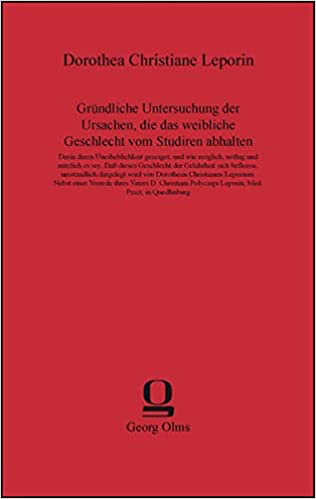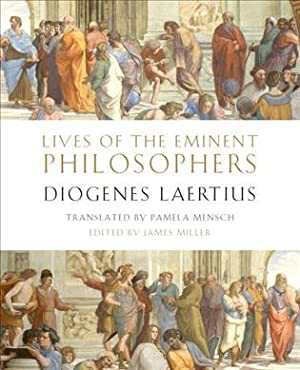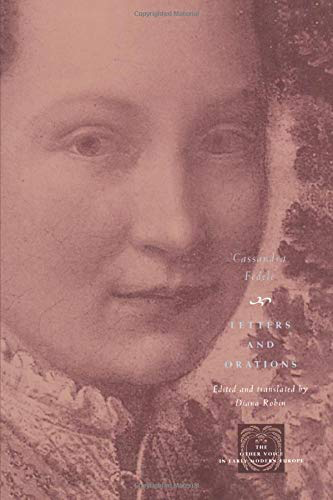Exclusive 3:16 Interview with Dorothea Christiane Leporin Erxleben

Interview by Richard Marshall

Dorothea Christiane Erxleben (née Leporin)has gained a measure of fame as the first woman to be awarded a medical doctorate in Germany, but is noted philosophically as the author of the Gründliche Untersuchung der Ursachen, die das weiblichen Geschlecht vom Studiren abhalten (Rigorous Investigation of the Causes that Obstruct the Female Sex from Study). According to her own account, she has written this text as a sort of personal exercise but maintains that her father insisted upon their publication (along with his own lengthy introduction) after coming across them and recognizing their value. Surprisingly, her book , in which she comprehensively rebuts the arguments against women’s suitability for study, was initially quite positively received and as a possible testament to the commercial interest it generated, it has been even illicitly re-published - although without Erxleben’s name or her father’s contribution - under a title that invokes the well-known series of textbooks by Christian Wolff: Vernünftige Gedanken vom Studiren des schönen Geschlechts ( Rational Thoughts on the Studies of the Fair Sex ).
3:16: What made you become a philosopher?
Dorothea Christiane Erxleben: Well Richard, let me quote Thomasius who writes: ‘Learnedness is knowledge through which one is enabled to distinguish well between the true and the false, the good and the evil, and to provide the causes, whether true or probable as the case may be, that ground it so that one might thereby promote the temporal and eternal well-being in the affairs of one’s own ordinary life and the lives of one’s fellows.’ I see learnedness as a grounded knowledge of such necessary and useful truths whereby the understanding and will, and consequently true human happiness, are improved. It combats uncertainty, error, hastiness, inconstancy, doubt or in a single word everything that flows from a darkened intellect and corrupted will.
3:16: Ok. You were the first German female medical doctor but you’ve been also philosophically involved in what’s been dubbed ‘the quarrel of women’, a centuries-long debate usually taken to extend from the 15th century to the French Revolution about a range of issues involving women, including their nature as putatively distinct from that of men and what this might entail with respect to their relative rank, appropriate social roles, and access to various offices and education aren’t you?
DCE: Yes Richard.

3:16: You’re ‘Rigorous Investigation’ is concerned to fight for women’s access to education and argues against the many ways women have been denied access to education. So many of the things you discuss are still, sadly, pertinent across the world to this day. So often girls and women are often refused education. Why do you think this is the case?
DCE: Prejudice Richard. Prejudices are among the foremost causes that obstruct the female sex from pursuing study, and among these, the first is the claim that learnedness is not appropriate for the female sex because the sex is incapable of any suitable accomplishment in learning.
3:16: Is this just a male prejudice?
DCE: Sadly no. It is the cause of some astonishment that many of the female sex shy away from learnedness because they suppose themselves to lack the powers requisite for its attainment.
3:16: So when we think about this prejudice, what do you think these people think learnedness is?
DCE: Let’s not dwell too much on the description of ‘learnedness’, but I guess what I take it to mean is a rigorous cognition of such necessary and useful truths whereby the understanding and the will are improved and consequently the true happiness of the human being is being promoted.
3:16: So are people saying that such a thing just is impossible as such by any woman?
DCE: No one would be so rash Richard.
3:16: So learnedness requires powers of rationality and understanding. Are the prejudiced arguing that women can’t be rational or have understanding?
DCE: Well, if the powers of the human soul are part of the image of God after which the human being is formed the female sex is created in accordance with this image as is the male. Therefore , whoever would deny the powers of the soul of the female sex would also have to hold that this sex is not made according to the likeliness of God or that the female has forfeited more of its originally received powers through the fall than the male sex and that they no longer stood in as favourable a position as the male sex such that a beginning could be made of restoring in them the lost divine image.
3:16: I guess people taking that line would be basically saying women weren’t really human?
DCE: We are not unworthy of the title human being Richard! The entire investigation can no doubt be applied to the rejection of the afore-mentioned inhuman allegation.
3:16: So in saying that women are human – a kind of obvious point – you think that already undermines the claim that somehow women can’t be rational and so on?
DCE: Yes. To claim that someone is a human being but does not possess any power of reason would be an all too obvious contradiction.
3:16: However, there are those who’ll not go as far as that but who nevertheless will say women aren’t as rational as men, who lack rationality to the degree needed for studying philosophy or anything really. What do you say to those?
DCE: Come on Richard: it’s they who owe us a demonstration which will never prove compelling to us.
3:16: Some say the proof is in the pudding: there are fewer women scholars therefore there’s the proof that women aren’t up to it.
DCE: Jeez Richard! It is a rather perverse inference for one to conclude from the fact that only a few women study that all of those who belong to this sex lack the powers of understanding requisite for this pursuit. It does not follow from the fact that one does not actually apply something or does not know how to apply it that one does not have or possess that thing. Of course, even though it cannot be denied many of the male sex are forgetful of their duty as far as the use of reason is concerned, one must nonetheless concede that this offence is far more common among the female sex, and one must concede, out of the regard for the many who dutifully pursue the cognition of truth, that it is correct when one claims that the male sex has accomplished more through their studies than the female sex. Yet their fault lies in a failure to properly apply the understanding they have received, which is understanding both sexes are endowed with in the same measure.
3:16: So the problem has been that women have, for many reasons, not studied rather than they didn’t have the ability to study?
DCE: Exactly. It’s about understanding being used, exercised and applied.
3:16: What do you say to those who say that individuals vary in their abilities so that’s why women just happen to be less capable of studying than men?
DCE: Richard, Richard, Richard (sighs)(long pause) (sighs) (longer pause). Richard, the question is not whether one human soul might be endowed with a degree of capability higher than others – which I gladly admit – but rather whether all souls of men are possessed of a higher degree of capability than all the souls of women , which I steadfastly deny.
3:16: Ok, I guess the commonest argument that does the rounds is that women are too emotional – more so than men – and these emotions make reasoning less effective and results in women being not as good as men.
DCE: This objection is of little significance. It is true that the affects obstruct the understanding of the cognition of truth, and thus even those who urge others in most emphatic terms to pursue the truth nonetheless discourage one from doing so when in the throes of affects. Moreover it is not to be denied that the female sex is more susceptible to these than is good for it; yet, whoever would contend that the male sex , considered in and for itself, is more free from these than the female sex before the influence of the affects is broken by study, would only reveal through such a pretension that he himself remains in thrall to them.
3:16: So do you think there is a link between studying and control of the emotions – generally, not just in terms of women?
DCE: When we attend to those who have learned to control their affects, we find that they have attained this happy state through applying themselves to study. Now if the female sex might endure the application of the curative means of study against this dangerous affliction then perhaps before long our Herr Doctors will be spared the effort of treating our sex as a special subject of disease on account of the intensity of the agitations of our mind Richard! The affects of the female sex are accordingly not to be regarded absolutely as causes which render the understanding useless for the cognition of truth and which cannot be ameliorated but are rather much more to be regarded as the consequences that arise when the improvement of the understanding and study are neglected.
3:16: What do you say to those who argue that studying can’t be done by women because they are inconstant by nature, they can’t stick to one thing but flap around from idea to idea and so can’t settle enough to really get to grips with whatever it is they’re studying?
DCE: Well now Richard, it’s true, real steadfastness is required if one is to grasp many truths but it would be unreasonable to demand steadfastness from someone whose mind has not acquired a temperament such that this quality might take root. Anyhow, one would lack any cause to reproach the female sex with inconstancy or to regard it as something that belongs to the essence of our sex since we find it as much in the male as in the female sex when that constitution of the understanding has not been put into place where it might possess a certain and rigorous cognition of what is good and evil. One also need not worry that inconstancy will inhabit the female sex from study since, as inconstancy is generally removed through study, so it is not to be feared that those who have once discovered the excellence of learnedness will cease seeking it earnestly.
3:16: What about the claim that even if we concede all the above – which of course I do Dorothea - philosophy is a specific problem for women? You yourself have pointed to intellectual women who have said that philosophy has proved difficult to them, suggesting that there might be an issue regarding women studying philosophy?
DCE: Well I did once say that Cassandra Fedele – an Italian scholar of Latin and Greek – often complained that insufficient talent made the study of philosophy difficult for her. But her complaints are to be attributed to her excessive modesty. Anyone familiar with her knows that she was well-versed in philosophy and one need only consult the ‘Selected Lives’ that came to light in Breslau in 1711 to banish any doubt about whether she lacked sufficient talent. As to the more general point, Menagius in his ‘History of Women Philosophers’ alone surveys sixty-five female philosophers, and one might also consult Reimann’s ‘Attempt at an Introduction to the History of Letters’, and Esberg’s schediasm on philosophising women will likely also prove useful. In general it does not require much effort to bring to light , little by little, the fact that many women who have already distinguished themselves through their studies are also rather accomplished in philosophy.

3:16: What about the idea of some that women aren’t as good as men at judgement?
DCE: Look – as you of all people know all too well Richard – not all men have much a mind that judgement constitutes its greatest part, but rather experience shows us that only the fewest among them can boast of being so fortunate. Many areas of study are such that intelligence and memory rather than judgement are required and one cannot entirely deny sharpness of mind of the female sex since experience teaches that many women , when they have not been unfortunate in their access to study, might compete with many men for pride of place as far as judgement is concerned.
3:16: True, true. You’re not downgrading judgment there though are you with that talk of memory and intelligence?
DCE: It is far from my intention to claim that someone will be able to attain much who has received only a small share of judgement, as I am a ware that even for someone who wants only pursue the so-called art of memory, judgment must still perform the lion’s share of the task. I also agree entirely with those who claim that the learning of a language does not depend merely on memory but also requires judgment, and I am myself of the opinion that, were it not the case that so much in his school depended on memory, Pythagoras would have requested a more sharpened power of judgment rather than a very powerful memory when, as reported by Diogenes Laertius, Hermes offered him the chance to request what he desired most. Those in whom judgment is lacking even if they are well-read and have committed much to memory, are nonetheless to be regarded as unfortunate people.
3:16: So as long we have a bit of judgement we will be ok?
DCE: I do not hesitate to assert that someone who has intelligence and a good memory and who is endowed with a passable faculty of judgement even if not the sharpest one is not in general unsuited for learnedness but is even capable of advancing rather far into it and might accomplish as much within philosophy as the average philosopher. But the point remains the same as earlier: the female sex is no doubt capable of accomplishing much with respect to learnedness but the male sex has nonetheless turned out some examples in certain areas of learnedness to whom the female sex must grant pride of place. It would be going too far to infer from this that each and every man surpasses every women in learnedness and indeed in all parts thereof. And even if the female sex had to cede their place to learnedness to every man it would not follow by any means that the female was unsuited to study. If one wanted to proceed in the strictness manner possible then one can infer from this no more than that the female sex could not attain the heights of what the male sex has achieved. It would be perverse to say on the basis of this because I am incapable of bringing about that same level of perfection in my own understanding as some others enjoy I would rather remain mired in ignorance.
3:16: Well, we don’t have to concede any of that do we. But I see the point. If someone says women can’t achieve as much as men they’re conceding that women can achieve something?
DCE: Exactly. I’m saying – wouldn’t it be better to cleanse the understanding of that sex as far as possible and grant it insight into as many truths as it might possibly grasp, rather than deliberately tarrying in ignorance and wilfully seeking nourishment in error instead of in the truths that one is able to comprehend.
3:16: You think there are two types of study don’t you – one that’s for everyone, and one that’s only for those you think are any good at it. Can you explain this distinction? The first study justifies universal education doesn’t it – education for everyone, boy and girl, smart and not so smart, rich and poor and so forth?
DCE: Sure. The first is study so that one helps one’s understanding as far as possible, provisioning it with useful truths that are better and more certain whereby the improvement of the will is also promoted. This is available to each and every person, even the most simple-minded; indeed, it would be praiseworthy for one to undertake to improve the understanding of such individuals through study, not only because they are in urgent need of it, but also because some of these are not the simple-minded by nature but only on account of lacking instruction in their youth – and even if our good intentions were not realised in a few cases certainly no harm could come of such efforts.
3:16: And what’s the second type of study?
DCE: By contrast no one should be permitted to take up studies of the second sort who has not been found through an exacting examination, to be particularly well suited to possess an appropriate temperament for it.
3:16: And of course you argue that women can’t – mustn’t – be excluded from either on the basis of their sex?
DCE: Yes. The female sex is not to be excluded from study on account of the claim that it must yield pride of place to men for as far as learnedness is concerned , or even on account of the contention that it could not attain to the highest level of learnedness. For were we to proceed with the male sex in the same way then many of them would likewise have to be turned away from study, even though experience shows that their efforts in this are not without fruit.
3:16: So you’re saying that if the prejudicial arguments used to barring women were applied across the board, the bar of entry would be too high and hardly anyone would be able to study?
DCE: Yes. Think about it: If only those were permitted to study who are not surpassed by any other in learnedness then at any given time only a single individual would be allowed to do so. Consequently learned people would be rare.
3:16: And who would know who was the unsurpassable anyway?
DCE: Good point Richard. It is well-known that there are many geniuses who found themselves in a poor condition first , though once someone devoted themselves tirelessly to their education they improved to such an extent that they rivalled those who had once surpassed them.
3:16: But it’s not just about missing geniuses is it? You just think everyone should have a good education and develop themselves no matter what?
DCE: It’s just a poor excuse to say that just because you’ve not been given the same share of talents as another one might just as well bury those talents that you have received.
3:16: And for the readers here at 3:16, are there five books you could recommend that would take us further into your philosophical world?
DCE: 
Diogenes Laertius ‘Lives of Eminent Philosophers’

Cassandra Fedele ‘ Letters and Orations.’

Michael Alberti ‘Philosophische Gedancken’

Anna Maria von Schurman ‘Dissertation on the Aptitude of Girls.’

Corey W Dyck ; Early Modern German Philosophy 1690 - 1750

About the Author
Richard Marshall is still biding his time.